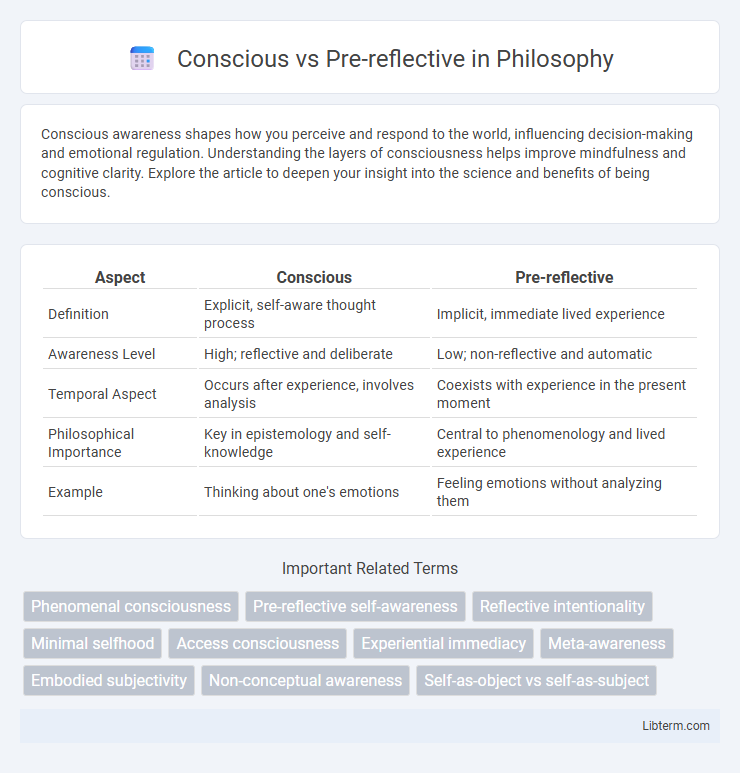Conscious awareness shapes how you perceive and respond to the world, influencing decision-making and emotional regulation. Understanding the layers of consciousness helps improve mindfulness and cognitive clarity. Explore the article to deepen your insight into the science and benefits of being conscious.
Table of Comparison
| Aspect | Conscious | Pre-reflective |
|---|---|---|
| Definition | Explicit, self-aware thought process | Implicit, immediate lived experience |
| Awareness Level | High; reflective and deliberate | Low; non-reflective and automatic |
| Temporal Aspect | Occurs after experience, involves analysis | Coexists with experience in the present moment |
| Philosophical Importance | Key in epistemology and self-knowledge | Central to phenomenology and lived experience |
| Example | Thinking about one's emotions | Feeling emotions without analyzing them |
Understanding Conscious and Pre-reflective States
Conscious states involve deliberate awareness and focused attention on thoughts, feelings, or actions, enabling reflective processing and self-reporting. Pre-reflective states operate beneath explicit awareness, characterized by an immediate, non-conceptual experience of phenomena without active self-reflection. Understanding the distinction between conscious and pre-reflective experiences is crucial for exploring the foundations of human cognition and phenomenology.
Defining Consciousness: Awareness and Attention
Consciousness involves both awareness--the ability to register and recognize stimuli--and attention, which directs cognitive resources toward specific experiences or thoughts. Pre-reflective consciousness occurs before explicit self-awareness, providing a basic, immediate experience without reflective thought, while reflective consciousness entails active consideration and evaluation of those experiences. Understanding this distinction clarifies how awareness can be present without deliberate attention, shaping cognitive processes related to perception and self-reflection.
What is Pre-reflective Experience?
Pre-reflective experience refers to the immediate, non-conceptual awareness of phenomena that occurs before conscious reflection or analysis. It involves direct, embodied perception and interaction with the world, where the individual is immersed in experience without explicitly thinking about it. Unlike conscious experience, pre-reflective experience is implicit and foundational to all subsequent reflective thoughts and self-awareness.
Key Differences: Conscious vs Pre-reflective
Conscious experience involves active reflection and awareness of mental states, whereas pre-reflective experience is immediate and non-thematic, occurring without explicit self-monitoring. Key differences include the level of self-awareness; conscious states demand intentional focus on thoughts or feelings, while pre-reflective states constitute the implicit, background of experience. Neuroscientific studies highlight distinct neural correlates for conscious reflection in prefrontal cortex regions, contrasting with pre-reflective processes linked to sensorimotor and subcortical activity.
The Role of Self-awareness in Conscious States
Self-awareness plays a critical role in distinguishing conscious states from pre-reflective experiences, as it enables individuals to actively recognize and evaluate their thoughts and emotions. In conscious states, self-awareness facilitates higher-order cognitive processes such as intentional decision-making and meta-cognition, whereas pre-reflective states involve automatic, implicit awareness without deliberate reflection. Neuroscientific studies link increased activity in the prefrontal cortex with self-awareness, highlighting its importance in modulating conscious mental states.
Pre-reflective Awareness in Everyday Life
Pre-reflective awareness operates as the background consciousness that shapes everyday experiences without deliberate thought, allowing individuals to engage with their environment seamlessly. This form of awareness underpins automatic bodily sensations, habitual actions, and immediate perceptions, enabling efficient navigation of daily tasks. Understanding pre-reflective awareness is crucial for studies in phenomenology, cognitive science, and mindfulness practices, as it reveals how consciousness functions beneath explicit reflection.
Philosophical Perspectives on Pre-reflective Experience
Philosophical perspectives on pre-reflective experience emphasize its role as the immediate, non-thematic awareness underlying conscious thought, where experience occurs without explicit self-reflection. Phenomenologists like Edmund Husserl and Maurice Merleau-Ponty argue that pre-reflective self-consciousness provides the foundational layer for intentionality and embodied perception. This non-conceptual and tacit mode of awareness contrasts with reflective consciousness, which involves deliberate introspection and conceptualization.
Neuroscientific Insights: Mapping Conscious and Pre-reflective States
Neuroscientific research differentiates conscious states, linked to the prefrontal cortex, from pre-reflective states mediated by sensorimotor and associative cortices. Functional MRI studies reveal heightened activity in the default mode network during self-aware conscious experiences, while pre-reflective awareness engages the insula and somatosensory regions for immediate bodily sensations. Mapping these distinct neural correlates enhances understanding of how conscious reflection and automatic experiential awareness coexist and interact in the brain.
Implications for Personal Identity and Subjectivity
Conscious experience involves explicit awareness and deliberate self-reflection, shaping a coherent narrative of personal identity through introspection and memory integration. Pre-reflective self-awareness operates as an immediate, non-conceptual sense of subjectivity, grounding identity in embodied being and affective presence without articulated thought. The interplay between conscious and pre-reflective modes influences how individuals perceive continuity of self, with pre-reflective awareness providing the foundational sense of existence while conscious reflection enables identity construction and self-understanding.
Integrating Conscious and Pre-reflective Awareness
Integrating conscious and pre-reflective awareness enhances cognitive flexibility by merging deliberate reflection with automatic, embodied experiences. This synthesis allows individuals to access deeper self-understanding, improving emotional regulation and decision-making. Studies in cognitive science suggest that mindful attention to pre-reflective states can bridge implicit knowledge with explicit consciousness, fostering holistic mental processes.
Conscious Infographic

 libterm.com
libterm.com